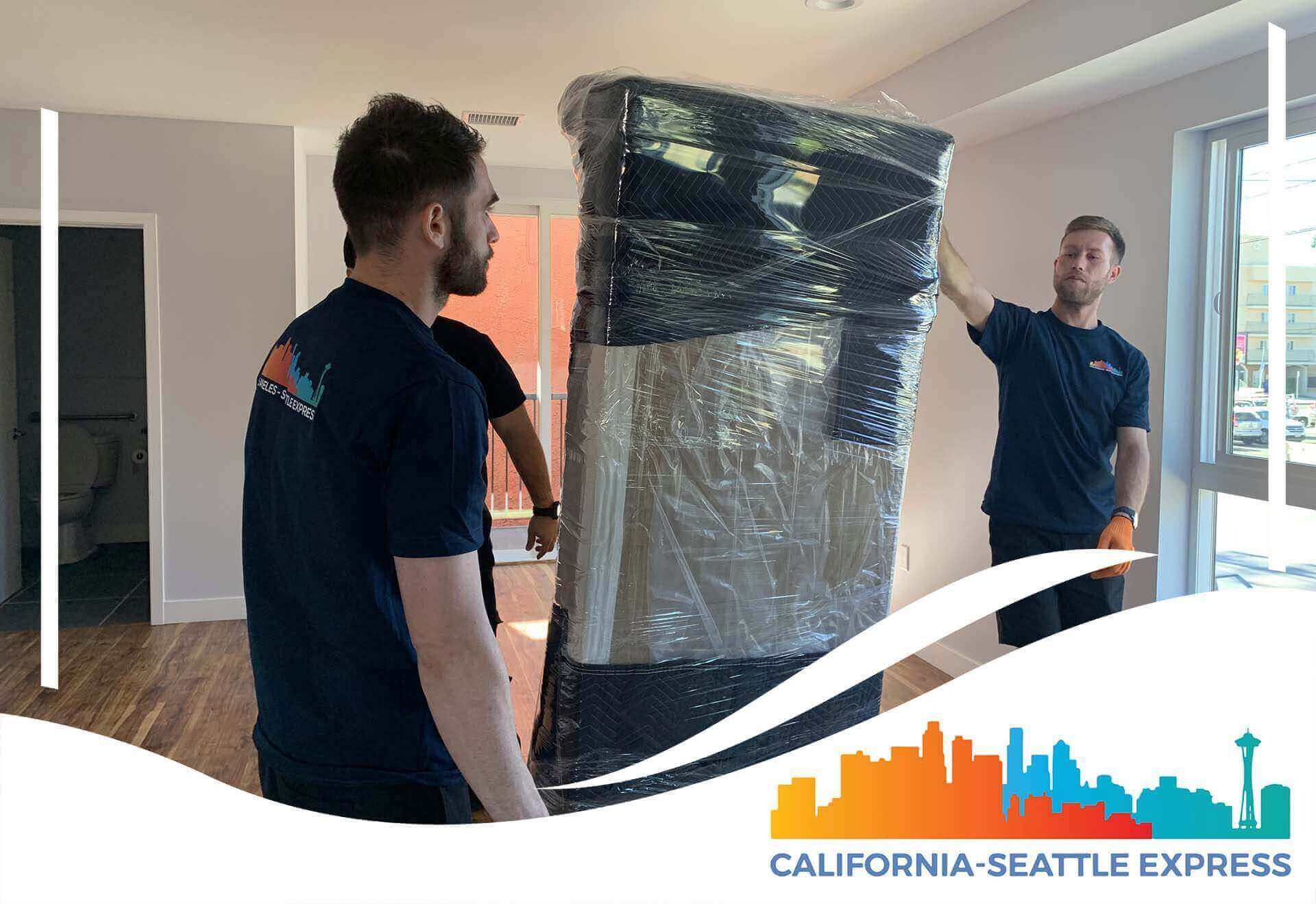Embarking on an interstate relocation between the Golden State and the Evergreen State, or the other way around? Whether you’re chasing new opportunities or seeking a change of scenery, relocating between California and Washington has its challenges and perks. Our blog provides essential moving interstate tips to make your transition smoother. Get ready to make your journey stress-free and rewarding!

When relocating to WA from CA, or the other way around, there are a few relocation tips that will help you. First, it’s a relocation essential to research as much as you can about the new state. Be sure to hire a professional cross-country moving company to help you with the transition, and then start organizing. Go into detail when planning, and have a to-do list by your side to make sure you don’t forget anything. Next up, declutter your home before you start to pack. Lastly, don’t forget to notify important parties about your upcoming change of address.
Researching the New State
Relocating to a new state is an exciting but daunting venture. It’s essential to conduct thorough research before making this significant transition. There are a few vital aspects to consider before you start planning your going-away party, such as climate, culture, laws, and housing options. This preparation will not only facilitate a smoother transition but also help in setting realistic expectations and making informed decisions – it’s a great relocation hack.
The climate of your new city can have a substantial impact on your daily life and well-being. It’s important to understand the weather patterns to prepare yourself accordingly. For instance, if you’re going from a warm state to a colder one, you’ll need to invest in appropriate clothing and maybe even learn how to drive in snow. Culture and lifestyle can also vary significantly between states. Some areas may have a more laid-back approach to life, while others are fast-paced. So, when deciding where to live, it’s worth considering if your lifestyle and values align with the cultural norms of the area you’re moving to.
Familiarizing Yourself With Local Laws, Regulations, and Tax Requirements
Different states have different laws and regulations that you should be aware of. For example, traffic laws, tenant rights, and employment laws can vary. Additionally, states have different tax structures. It’s crucial to know what your tax liabilities will be in the new state, as this may impact your budget and decision to relocate out of state. Familiarizing yourself with these aspects will help you adjust to your new environment without unexpected surprises.
Exploring Housing Options and Neighborhoods in the New State
Before relocating to another state, it’s wise to explore various housing options. Are you looking to rent or buy? What is the real estate market like? It is also vital to research neighborhoods. Look for areas that are safe, have good schools (if you have children), and are close to amenities like parks, shopping centers, and healthcare facilities. Online resources, forums, and speaking with local residents can offer valuable insights into different neighborhoods.

Hire a Professional Long-Distance Moving Company to Assist You
Relocating to another state alone can be a monumental task, and hiring cross-country movers from a professional long-distance moving company can ease the process considerably. When you move across state lines, there are numerous logistics to manage. Reputable movers from Seattle to California, such as California-Seattle Express, have the expertise to handle these quickly and make your relocation efficient, thanks to their expert moving services.
They have the necessary equipment, vehicles, and trained staff to ensure that your belongings are packed, loaded, and transported safely. Moreover, they can provide invaluable advice and help in planning and coordinating the transition to your new home, saving you time and reducing stress.
Use a Variety of Long-Distance Moving Services to Make Your Relocation a Stress-Free One
Many long-distance relocation companies offer a variety of services that can be tailored to your needs. For instance, you can opt for packing services, which can be a godsend, especially for larger households. Some companies provide storage solutions, which can be helpful if your new home is not ready yet or you’re relocating to a smaller home. Moreover, relocation insurance ensures that in the rare event of damage or loss, you are covered.

Go Into Detail When Planning the Logistics
When relocating to another state, meticulous planning is paramount to ensure a seamless experience. Delve into specifics, such as how you’ll transport your belongings, the route you’ll take, and accommodations along the way if it’s a multi-day journey. Be sure to have a comprehensive relocation inventory of your possessions, as this will aid in obtaining accurate quotes and help in case you need to make an insurance claim. Also, consider the layout of your new home to determine if larger pieces of furniture will fit or if they need to be disassembled.
Set a Moving Date Months in Advance
Selecting a moving date well in advance is critical. It not only helps you secure the services of your chosen relocation company but also allows you ample time for preparation – why suffer the stress of a last-minute relocation? Be mindful of the season – relocating during peak times like summer may be more expensive. Moreover, setting a date early gives you a timeline to work against, keeping you on track with packing and other related tasks.
Write a To-Do List So You Don’t Forget Any Relocation-Related Tasks
Every guide to relocating to another state will tell you that creating a relocation to-do list is essential for keeping track of all the tasks associated with the upcoming relocation. Here is an example of what it should look like – all the important tasks are listed, but you can always customize them to fit your needs.
6-8 Weeks Before
- Research and book a relocation company.
- Start decluttering and sorting belongings into keep, sell, and donate categories.
- Remember who to notify about relocating – schools, doctors, and other important services.
4-6 Weeks Before
- Gather packing supplies.
- Begin packing non-essential items.
- Change your address with the postal service.
2-4 Weeks Before
- Schedule utility transfers for the new home.
- Confirm details with the relocation company.
- Arrange cleaning services for move-out cleaning.
1 Week Before
- Pack a suitcase with essentials for the first few days.
- Double-check all the relocation arrangements.
- Begin defrosting the refrigerator if needed.
Moving Day
- Conduct a final walkthrough of the old home.
- Ensure all boxes are labeled and ready for transport.
- Hand over the keys and settle any remaining bills.
Sort and Declutter Belongings Before You Start Packing
How to prepare to move to another state? Before embarking on the packing process, it’s essential to sort and declutter your belongings. This step can significantly streamline the relocation process and even save costs by reducing the volume of items to be transported. Begin by categorizing your possessions into groups, such as clothing, kitchenware, books, and more.
As you sort through each category, critically assess what you use regularly and what has sentimental value. Identify items that have not been used for a long time, are redundant, or no longer serve a purpose in your life. Creating distinct piles for what to keep, donate, sell, or discard can help organize this process.
Storage Services
Looking for storage space while you get settled? California-Seattle Express provides 30 days free storage with your move.
Car Shipping Services
We can ship your vehicles using the best freight options available. Your car will be moved safely and securely and arrive as planned.
Packing Services
Our professional packers have methods and techniques to ensure all your items are intact during and after the move.
Organize a Garage Sale to Get Rid of Unwanted Items
Once you’ve decluttered and identified items that you no longer need, organizing a garage sale is an excellent way to get rid of these items while making some extra cash to fund your relocation. Start by choosing a date for the garage sale, preferably on a weekend when more people are likely to attend. Advertise your garage sale locally through social media, community boards, and word of mouth.
As the garage sale date approaches, price your items reasonably and display them in an organized manner to attract buyers. Have a mix of payment options available, including cash and digital payment apps. After the sale, you can donate furniture or household items that you couldn’t sell to charity or give away to friends and family. If the idea of having a garage sale sounds appealing to you, be sure to check out the video below for more information on how to throw a successful sale in your yard!
Don’t Forget to Notify Important Parties About Your Upcoming Relocation
When planning an interstate relocation, it’s easy to get caught up in packing and logistics. However, it’s equally crucial to inform important parties about your upcoming relocation to ensure a smooth transition – don’t make a common relocation mistake of forgetting that task. Here are three essential steps in this process.
Forwarding Mail and Updating Addresses With the Post Office
One of the first steps should be to update your address with the post office. This can usually be done online or at a local branch. By forwarding your mail, you ensure that all your correspondence, including bills, subscriptions, and official communications, are sent to your new address. It’s also prudent to update your address with online retailers and subscription services.
Informing Utility Companies, Banks, and Insurance Providers of the Move
Before the move, contact your utility companies to schedule service disconnection at your old home and connection at the new one. Ensure your final bills are settled. Additionally, inform your bank and insurance providers of your new address. This is important for statements, policies, and any location-specific banking or insurance considerations.
Transferring Medical Records and Notifying Schools or Other Institutions
If you or your family members are under medical care, contact your healthcare providers to transfer medical records to a new doctor in your new state. Request copies of prescriptions and, if necessary, a supply of medications to cover the transition period. For families with children, notify their current school about the move and arrange for the transfer of academic records to the new school.

With These Useful Moving Interstate Tips and California-Seattle Express By Your Side, You’ll Relocate Without a Fuss
Relocating between California and Seattle doesn’t have to be a daunting process. Armed with the practical long-distance moving tips we’ve shared, and by enlisting the services of California-Seattle Express, you’re well on your way to a stress-free move. As a premier relocation company, California-Seattle Express specializes in providing exceptional services tailored to the specific needs of those relocating between these two vibrant states.
What sets California-Seattle Express apart is our expertise and dedication to customer satisfaction. With a fleet of modern vehicles, skilled professionals, and a range of customizable services, we ensure that your belongings are handled with utmost care. Whether you need packing services, temporary storage, or specialized handling for fragile items, we’ve got you covered. You can rely on our long-distance movers in California and Seattle, WA, to help you make this experience simple and effortless! Contact us today and get a free quote for your move.
Interstate Moving FAQs
Are There Any Specific Regulations or Permits Required for Interstate Moves?
While there are no specific permits required for individuals relocating interstate, it’s essential to understand that relocation companies must comply with federal regulations. They should have a US Department of Transportation (USDOT) number and be registered with the Federal Motor Carrier Safety Administration (FMCSA). It’s wise to check that the company you choose complies with these regulations to ensure the legitimacy and safety of the services they provide.
How Can I Ensure the Safety and Security of My Belongings During the Move?
Ensuring the safety and security of your belongings during an interstate relocation requires meticulous planning. Begin by taking inventory and photographs of your items. Use sturdy packing materials and boxes, and ensure fragile items are wrapped securely. It’s also advisable to opt for relocation insurance to cover potential damages or loss. Moreover, select a reputable shipping company with a track record of reliability and customer satisfaction.
What Are Some Tips for Adjusting to the New State's Climate and Lifestyle?
Adjusting to a new state’s climate and lifestyle involves both mental and physical preparation. For the climate, acquire appropriate clothing and gear. For instance, if going to a colder region, invest in winter clothing. Understand and be prepared for seasonal weather patterns. Regarding lifestyle, immerse yourself in the local culture by participating in community events and social groups. Keep an open mind, and be willing to adapt to the local norms and pace of life. Understanding that adjustment takes time can ease the transition.
How Can I Find Reputable and Reliable Moving Companies for Interstate Moves?
Finding a reputable relocation company involves researching and gathering recommendations. Start by asking friends or family who have recently moved for suggestions. Online reviews and ratings on platforms such as Better Business Bureau can also provide insights. Additionally, verify the company’s USDOT number and FMCSA registration. Obtain quotes from multiple companies, and ensure that they conduct an in-person or virtual assessment of your belongings before giving an estimate.
How Can I Handle the Logistics of Transporting Pets During an Interstate Move?
When relocating with pets, plan ahead to ensure their safety and comfort. Schedule a check-up with the vet to ensure your pet is healthy and up-to-date on vaccinations. On a relocation day, keep your pet in a carrier and ensure access to water and food. It’s wise to keep them in a quiet area away from the hustle. If the journey is long, make frequent stops for bathroom breaks and exercise. Research pet-friendly accommodations if an overnight stay is required.





